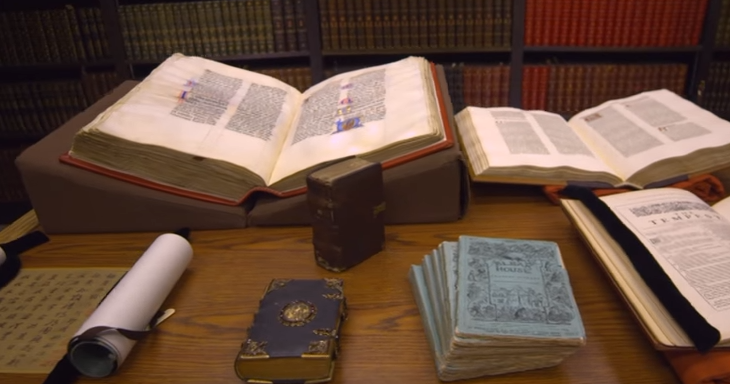BTN.com LiveBIG Staff, January 14, 2016
During football and basketball games, BTN LiveBIG will spotlight notable examples of research, innovation and community service from around the conference. In-Game stories will provide more background on these features, and the opportunity to view the videos again.
Did you know time travel is possible at the University of Iowa?
No, the school doesn't have something that could have come out of an H.G. Wells novel, a device with the ability to send human beings back to a specific year long before the present. But Iowa?s Center for the Book offers sensory experiences that can transport people to an age that predates Guttenberg?s invention of the printing press in the 15th century.
The center specializes in making books by hand: everything from the paper to the text to the binding. Their methods would be more or less familiar to a European monk writing a Bible during the Middle Ages or a Ming Dynasty official keeping records of construction on sections of the Great Wall of China.
?Paper was invented in China around the time of Christ, and it?s been with us ever since,? said Tim Barrett, director of the Center for the Book. ?[It?s] been responsible for the transmission of culture in society for centuries.?
The process for paper-making at the center begins with heating and beating cotton fibers to a pulp, then putting that material into a mold to make sheets. Once the sheets have been flattened, shaped and couched, the sheets are hung to dry. After that, they?re ready to be written or drawn upon, then stitched into the binding of a book.
The specialized knowledge of making paper this way has led to some interesting projects for Barrett and others at the center.
?We?ve been called on to make paper for specialty applications,? Barrett said. ?The Center for the Book made the paper that sits beneath the Charters of Freedom at the National Archives in Washington, D.C. We?re real proud of that.?
The simple experience of holding books made in this way (not to mention making them) provides a sort of portal to the past, said Amy Richard, a fine arts graduate student at Iowa.
?It connects us with our ancestors, going back a long way and seeing how they express themselves ? how they try to help others understand the mysteries of life,? she said. ?One of my favorite things about studying here at the Center for the Book is having access to this Special Collections library, where we are able to look, touch and hold books that have been around for hundreds and hundreds of years.
?We all talk about it - we can?t really explain it, it?s hard to articulate - but there?s an energy that comes off that page from the handwriting to the illustrations. It?s just magical. For me, there?s a sense of mystery when I open a book that?s 600 years old and ? even though it?s written in Latin or Greek and I don?t understand the language, there?s still this incredible reverence.?
Watch the one-minute video above to get a read on Iowa?s Center for the Book.








